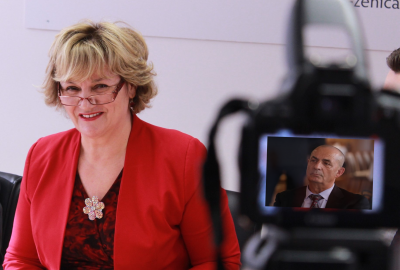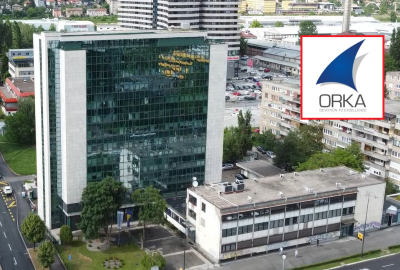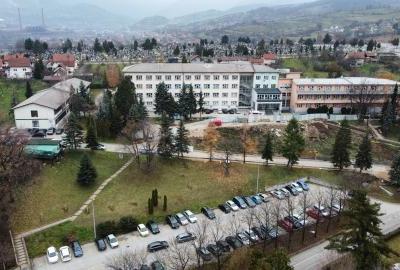Žurnal in English
CONFLICT OF INTEREST IN PRACTICE: Škaljo, Banjac and Stojanović know how to circumvent the law and take at least two budget salaries
In the sea of different names on the candidate lists, there are many who have been successfully living of of the budget for years. Using the shortcomings of the law on preventing conflicts of interest at all levels, they successfully receive two or more budget salaries and allowances, without the possibility of sanctions

Omer Škaljo, Darko Banjac and Spomenko Stojanović are just some of the candidates in this year's elections who receive two or more budget salaries and allowances, which is allowed to them due to poor legal regulations and disputed interpretations when it comes to laws concerning the prevention of conflicts of interest.
PUBLIC ENTERPRISE OR PUBLIC INSTITUTION? IT MATTERS!
Omer Škaljo is the director of the Health Insurance Institute of the Zenica-Doboj Canton (ZZO ZDK). It is, of course, an institute at the cantonal level. However, Škaljo is also a representative in the ZDK Assembly, the canton that is practically the owner of this institute. Škaljo also ran for the ZDK Assembly this year, this time in the SBB jersey.
So, in addition to receiving a director's salary and a representative's lump sum (and perhaps a pension, which we wrote about), Škaljo as a representative can directly decide on, for example, the reports of the institute he heads. However, Škaljo is not in a conflict of interest. By the way, Žurnal wrote extensively about Omer Škaljo himself.
 ZAŠTITa STRANAČKIH MILJENIKATužilaštvo ZDK neće provoditi istragu protiv Omera Škalje
ZAŠTITa STRANAČKIH MILJENIKATužilaštvo ZDK neće provoditi istragu protiv Omera Škalje
Namely, the law treats public companies, but not public institutions. In other words, Škaljo could not be the director of a company owned by the canton, but he could be the director of the Health Insurance Institute ZDK. Transparency International in Bosnia and Herzegovina warns of this illogicality.
"The laws that regulate the conflict of interests of elected representatives, holders of executive functions and advisers do not decisively prescribe incompatibility with public institutions, that is, public institutions are not clearly treated by laws at all. Certainly, the aforementioned represents a huge lack of legal regulation and enables the performance of functions for which, in our opinion, incompatibility should be clearly prescribed", he writes in the answer to Žurnal.
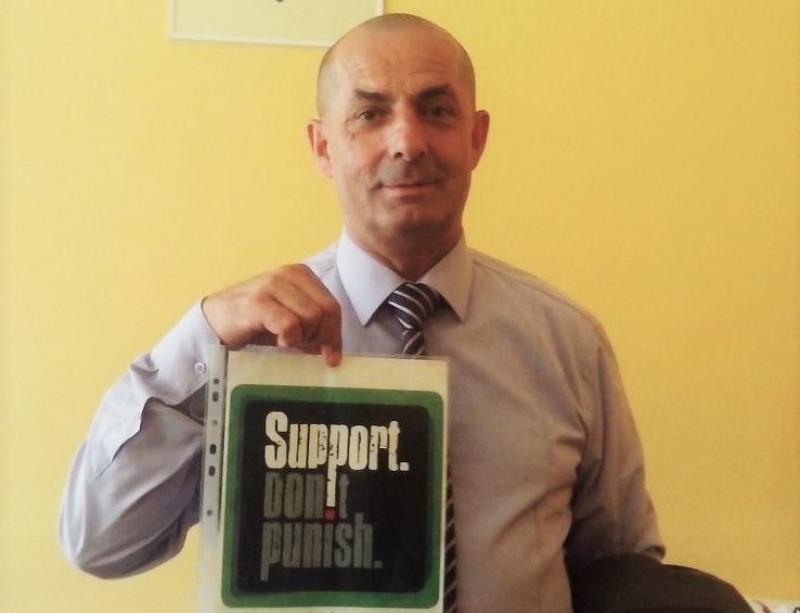
Of course, Škaljo is neither the first nor the only politician to find himself in this kind of situation. On the candidate lists for the upcoming elections, there are a number of politicians holding dual positions. Let's mention two more candidates. According to the available data, Ana Zlovečera Jukić (HDZ BiH) is the director of the JZU Dom zdravlja (health center) with the Žepče inpatient unit. The owner of this institution is the Municipality of Žepče, and Ana Zlovečera Jukić is a councillor in the Žepče Municipal Council. Should it even be said that the councillors, for example, discuss and decide on the reports and operations of this institution. By the way, Ana Zločera Jukić is this year's candidate for the House of Representatives of the Parliamentary Assembly of Bosnia and Herzegovina.
We have a similar situation in Posušje. The available information says that Kristina Milas is a councillor in the municipality of Posušje, and at the same time she is the director of the Bajka Kindergarten, owned by the Municipality of Posušje. Milas is an HDZ BiH candidate for the Assembly of the Zapadnohercegovački Canton. There are dozens of identical and similar examples.
IT IS IMPORTANT WHO AND HOW THE LAW IS INTERPRETED
In the sea of systemic anomalies that the government is greatly abusing is the institute of acting directors. According to the official interpretation of the law, persons who are in public office in an acting mandate and at the same time in the function of an elected representative are not in a conflict of interest because, it is emphasized, acting in the office is considered to be a temporary performance of a function in a limited capacity.
Nevertheless, it is clearly visible from practice that the acting director function does not represent a function of limited time duration at all, moreover.
Although there are more such examples, we will now only mention Darko Banjac, a faithful associate of Milorad Dodik and his SNSD. Let us remind you that Banjac is a member of parliament in the National Assembly of Republika Srpska. At one time, Darko Banjac, in order to remain in the coalition with the ruling structure in the RS, left the DNS and founded a new party - Narodna partija Srpske or the People's Party of Srpska . This year he also ran for MP.
Although he is a member of the National Assembly of Republika Srpska, Banjac is also the head of an institution owned by this entity. It is Mlječanica Hospital, and Banjac has been acting director since mid-2020. Due to the official interpretation of the law, Banjac is not in a conflict of interest.
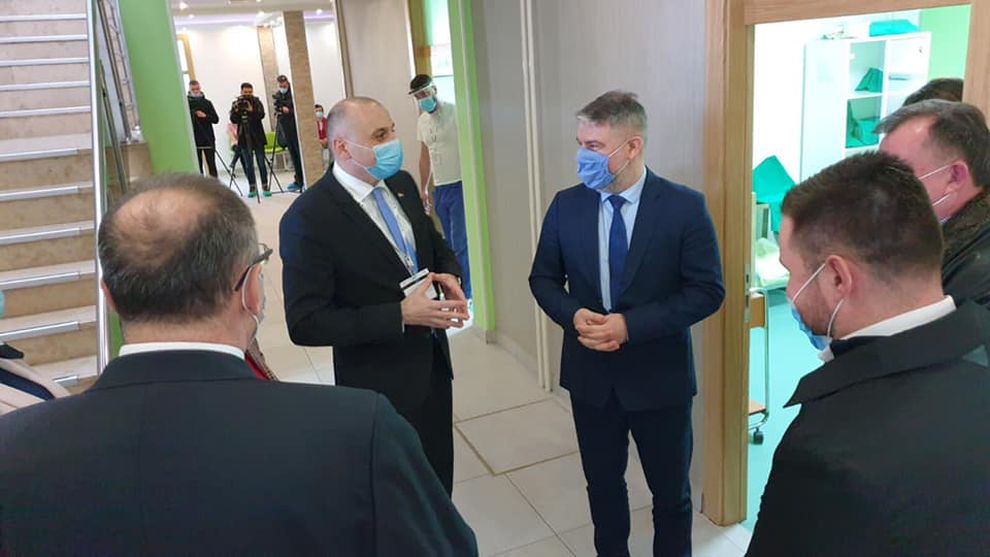
Transparency International in Bosnia and Herzegovina has been pointing out the illogicality and illegality of the decisions that people who are in public office in an acting mandate, and at the same time in the function of an elected representative, do not find themselves in a conflict of interest for a long time.
"It is clearly visible from practice that the executive does not in any way represent a function of limited duration, that the mandates of the executive are renewed indefinitely, thus consciously avoiding the situation of incompatibility of functions, and circumventing the legal provisions. In support of the above is the fact that the bodies that make decisions on appointments even state in their decisions that, for example, the director of a public company in an acting mandate has the same certification as the director", they state from TI BiH.
Let's briefly point out that since he has been at the head of the Mlječanica Hospital, until the end of June 2022, Banjac has spent around 20 million KM. By way of comparison, from 2015 until his arrival, only about two million KM were spent. The money is secured by a million-dollar loan and funds from the RS Government, and we have already written that the money is being spent in a suspicious way.
Furthermore, Spomenko Stojanović (Democratic Alliance - DEMOS) is also a member of the RS National Assembly, and this year he is seeking voter support to be elected to this position. Stojanović is also the director of ŠG Maglić Foča, a forestry company that operates as part of PE Šume Republike Srpske.
TI BiH addressed the Commission for the prevention of conflicts of interest in the authorities of Republika Srpska, but they are of the opinion that forest farms do not represent public enterprises, but organizational units of public enterprises, so there is no conflict of interest in this regard.
"The above points again to the vagueness of the law, and clearly indicates the need to change it as soon as possible in such a way as to clearly and unequivocally regulate the conflict of interests and incompatibilities, and extend the effect to public institutions and other public bodies and persons to whom it applies", they point out from TI BiH.
Let's mention another example from the local level. Anto Brtan, candidate of the HDZ BiH for the Assembly of the Central Bosnia Canton, is currently the director of the PI Agency for Cultural, Historical and Natural Heritage and Development of Tourist Potentials of the City of Jajce, or PI Agencija Jajce for short.
At the same time, he is in the Commission for the selection of regulated bodies of the Municipality of Jajce. We wrote about it, and now we'll just remind you that it is easy to get into a situation where Brtan, as a member of the mentioned commission, conducts a competition procedure for the selection of members of the Management Board of the agency he heads, and who can later decide on his fate as a director!
 OPĆINA JAJCEPripadnost stranci jača od svakog zakona
OPĆINA JAJCEPripadnost stranci jača od svakog zakona
Anto Brtan told Žurnal, however, that he does not consider it controversial: "In such cases, I recuse myself and the rest of the commission does the work. This applies to any member of the commission for whom there is a certain conflict of interest."
The Law on Prevention of Conflicts of Interest in the FBiH does not prescribe incompatibilities of the aforementioned functions, so the law is vague here as well. However, if the described situation were to occur, a possible conflict of interest could be derived from the very principles of the Act on the Prevention of Conflict of Interest, TI BiH explained to Žurnal.
Although conflict of interest is often discussed in Bosnia and Herzegovina, it is clear that it is rarely sanctioned. One of the few who have been punished is HDZ BiH leader Dragan Čović. Namely, the Hrvatski narodni sabor or Croatian National Assembly (HNS), led by Čović, as a non-governmental association, received money from the budget, even though the HDZ leader was a member of the BiH Presidency at the time. HNS received 16,750 KM, and Čović was only punished with a 10% reduction of one month's salary.
So, in addition to rarely being sanctioned, the punishments are purely symbolic. Clearly, the biggest problem is bad legislation. In our country, there are four laws whose content directly relates to this area - law at the level of the Brčko District, laws at the level of two entities, and law at the level of Bosnia and Herzegovina.
From these few examples, it is clear that a change in legislation is necessary. First of all, more precise and comprehensive law(s), and the elimination of certain illogicalities such as we see for example in the Federation of BiH where, practically, there is no one to punish the conflict of interest, considering the blocking of the work of the Commission for deciding on the conflict of interest.
Finally, let us remind you that the adoption of the new law on the prevention of conflicts of interest, along with the adoption of new laws on public procurement and the HJPC, are one of the key priorities when it comes to BiH's European path. Although so far there have been several initiatives and proposals for this, the new law on preventing conflicts of interest has not yet been adopted.
(zurnal.info)










